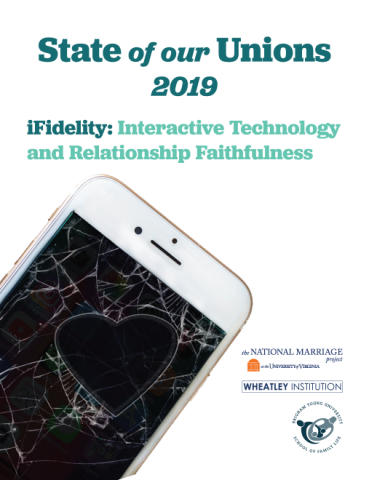Younger Americans are more likely to push emotional and sexual boundaries online...
...and those who do so have worse relationships, according to iFidelity: The State of Our Unions 2019.
Based on a 2018 YouGov survey of relationship attitudes and behaviors online and in real life, iFidelity presents the first generational overview of how Americans think about sexual fidelity online in the wake of the iRevolution and the first study of the links between sexual fidelity online and relationship quality among American men and women.
The newest State of Our Unions report from the National Marriage Project at the University of Virginia, the Wheatley Institution, and the School of Family Life at Brigham Young University offers three key sets of findings:
1 – Although a clear majority of Americans in all generations express support for sexual fidelity in their relationships and report they are sexually faithful in real life, today’s young adults are markedly more likely to cross online boundaries related to sex and romance. For example, 18% of Millennial participants engaged in sexual talk online with someone besides their partner, compared to 3% of Greatest/Silent generation participants, 6% of Baby Boomers, and 16% of Gen Xers.
2 – Many online behaviors are rated by most Americans (70% or more) as “unfaithful” or “cheating,” including having a secret emotional relationship or sexting with someone other than a partner/spouse without the partner’s/spouse’s knowledge and consent.
3 – Married and cohabiting men and women who maintain strong boundaries online against potential sexual and romantic alternatives are more likely to be happy in their relationships. Those currently married or cohabiting who blur those boundaries are significantly less happy, less committed, and more likely to break up while, conversely, those taking a more careful stance online are happier, more committed, and less likely to separate. For example, those who did not follow a former girlfriend/boyfriend online had a 62% likelihood of reporting that they were “very happy” in their cohabiting or marital relationship. Only 46% of those who did follow an old flame online reported being very happy.
The 2019 State of Our Unions report suggests that young adults who have come of age in the age of the internet are the least committed to iFidelity. Moreover, those who cross emotional and sexual boundaries online have markedly lower quality relationships. iFidelity, then, suggests that our online conduct is linked to the health of our real-life relationships.
To view or download the report (pdf) click here.
To view or download a copy of the press release (pdf) click here.

